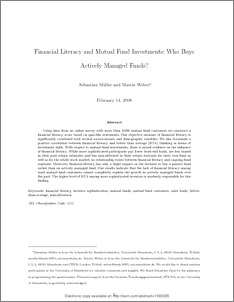|
Financial Literacy and Mutual Fund Investments : Who Buys Actively Managed Funds?
Müller, Sebastian
;
Weber, Martin
![[img]](https://madoc.bib.uni-mannheim.de/2278/1.hassmallThumbnailVersion/SSRN_ID1314778_code698431.pdf)  Vorschau |
|
PDF
SSRN_ID1314778_code698431.pdf
- Veröffentlichte Version
Download (281kB)
|
|
URL:
|
http://ub-madoc.bib.uni-mannheim.de/2278
|
|
URN:
|
urn:nbn:de:bsz:180-madoc-22786
|
|
Dokumenttyp:
|
Arbeitspapier
|
|
Erscheinungsjahr:
|
2008
|
|
Titel einer Zeitschrift oder einer Reihe:
|
None
|
|
Sprache der Veröffentlichung:
|
Englisch
|
|
Einrichtung:
|
Fakultät für Betriebswirtschaftslehre > ABWL u. Finanzwirtschaft, insbes. Bankbetriebslehre (Weber 1993-2017)
|
|
MADOC-Schriftenreihe:
|
Lehrstuhl für ABWL, Finanzwirtschaft, insb. Bankbetriebslehre (Weber) > Working Papers
|
|
Fachgebiet:
|
330 Wirtschaft
|
|
Fachklassifikation:
|
JEL:
G11 ,
|
|
Normierte Schlagwörter (SWD):
|
Kapitalanlage , Wissen , Investmentfonds , Anlageverhalten , Kapitalanleger
|
|
Freie Schlagwörter (Englisch):
|
financial literacy , investor sophistication , mutual funds , mutual fund customers , better-than-average , miscalibration
|
|
Abstract:
|
Previous research indicates that lacking financial sophistication among private investors might be important in explaining the strong growth in active management over the past. Based on questionnaire data with more than 3,000 mutual fund customers, we therefore construct an objective financial literacy score and analyze the relationship between financial literacy and mutual fund investment behavior. While sophisticated investors are indeed more aware of passive, low cost fund alternatives like index funds or Exchange Traded Funds (ETF), financial literacy has only a modest impact on the decision to invest passively rather than actively. "Smart money" among smarter investors cannot explain this finding: There is only very weak evidence of superior fund selection abilities among more financially literate investors at best. In contrast, our results suggest that overconfidence is an important determinant of the decision to invest active vs. passive. Smarter investors believe to be better than average in their fund choices, but our results show that they are not. In additional analyzes we show that although more sophisticated participants pay lower front-end loads and have more accurate performance perceptions, no relationship exists between financial literacy and ongoing fund expenses. Our results indicate that the lack of financial literacy among most mutual fund customers cannot completely explain the growth in actively managed funds over the past.
|
|
Zusätzliche Informationen:
|
Available at SSRN: http://ssrn.com/abstract
|
 | Das Dokument wird vom Publikationsserver der Universitätsbibliothek Mannheim bereitgestellt. |
 Suche Autoren in Suche Autoren in
Sie haben einen Fehler gefunden? Teilen Sie uns Ihren Korrekturwunsch bitte hier mit: E-Mail
Actions (login required)
 |
Eintrag anzeigen |
|
|
 ORCID: 0000-0001-5018-3317
ORCID: 0000-0001-5018-3317



 Suche Autoren in
Suche Autoren in